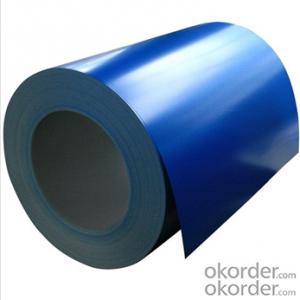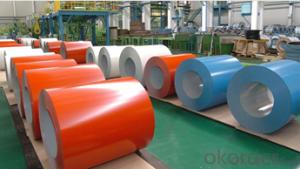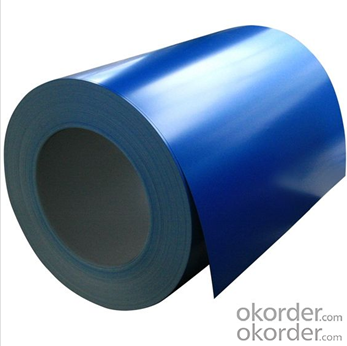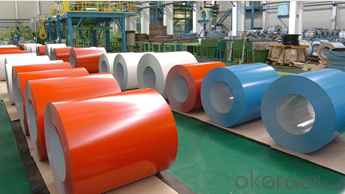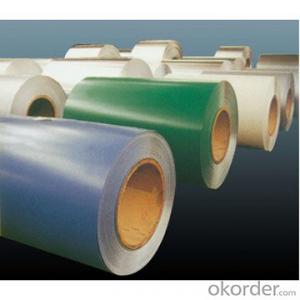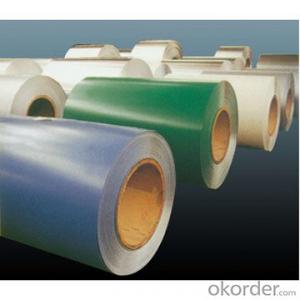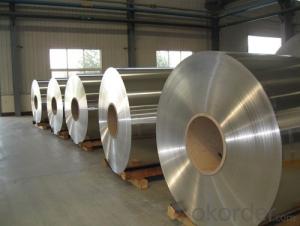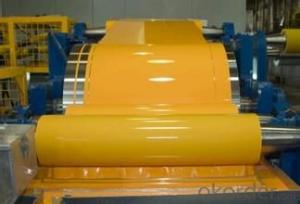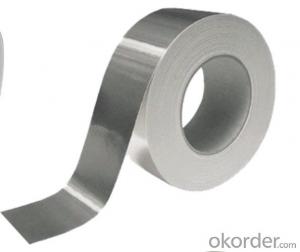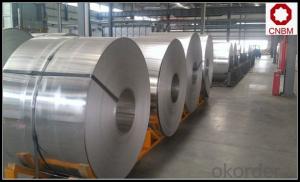1100 H14 Prepainted Color Coated Aluminum Coil
- Loading Port:
- Qingdao
- Payment Terms:
- TT OR LC
- Min Order Qty:
- 5 m.t.
- Supply Capability:
- 5000 m.t./month
OKorder Service Pledge
OKorder Financial Service
You Might Also Like
Specification
Structure of Prepainted Aluminum Coils 1XXX Description
Prepainted Aluminum Coils 1XXX are of a wide range of colors, which give wonderful appearance no matter in residential and commercial constructions or great exhibition centers.
Prepainted Aluminum Coils 1XXX have been widely used in the fields of construction and decoration, electronic applications, lighting decoration, air-condition air pipes, sandwich panels and drainages etc.
Description
Main Features of Prepainted Aluminum Coils 1XXX
• Superior quality of raw material
• Reasonable and stable chemical composition
• Accurate tolerance
• Goode mechanical property
Pictures
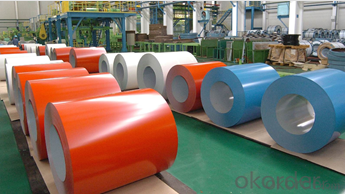
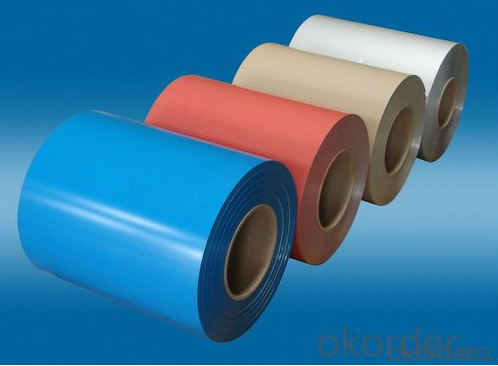
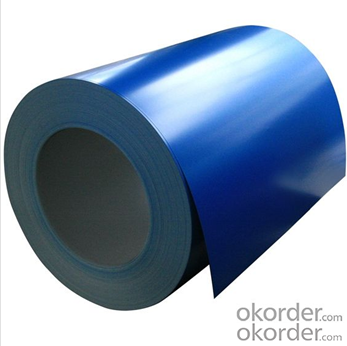
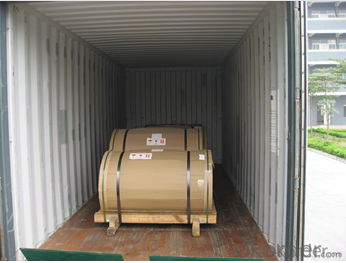
Product Description
Aluminium is remarkable for the metal's low density and for its ability to resist corrosion due to the phenomenon of passivation. Structural components made from aluminium and its alloys are vital to the aerospace industry and are important in other areas of transportation and structural materials. The most useful compounds of aluminium, at least on a weight basis, are the oxides and sulfates.
Despite its prevalence in the environment, no known form of life uses aluminium salts metabolically. In keeping with its pervasiveness, aluminium is well tolerated by plants and animals. Owing to their prevalence, potential beneficial (or otherwise) biological roles of aluminium compounds are of continuing interest.
The earliest citation given in the Oxford English Dictionary for any word used as a name for this element is alumium, which British chemist and inventor Humphry Davy employed in 1808 for the metal he was trying to isolate electrolytically from the mineral alumina. The citation is from the journal Philosophical Transactions of the Royal Society of London: "Had I been so fortunate as to have obtained more certain evidences on this subject, and to have procured the metallic substances I was in search of, I should have proposed for them the names of silicium, alumium, zirconium, and glucium."
FAQ
1. What is the applications?
Outdoor decoration, business chain, exhibition of advertisement decoration and display ,ACP, wall cladding, facades, roofs and canopies, ceilings, signboards, blind window, display platforms, electrical panels etc.
2. What is the popular size?
1000*2000,1200*2400,1219*2438,1220*2440
1000*3000,1250*3000,1500*3000 etc.
3. What is the coating?
Polyester, Fluorocarbon, polyurethane and epoxy coating
4. What is the Surface Quality?
be free from Oil Stain, Dent, Inclusion, Scratches, Stain, Oxide Dicoloration, Breaks,
Corrosion, Roll Marks, Dirt Streaks and other defect which will interfere with use
5. How about the shipment?
Shipment: By bulk vessel or By container
Welcome to inquiry us! Hope we can establish a long-term relations of cooperation.
- Q: What are the different edge profiles available for aluminum coils?
- There are several different edge profiles available for aluminum coils, including square edge, round edge, and beveled edge. These profiles provide different levels of protection and aesthetics, allowing for customization based on specific application requirements.
- Q: How do aluminum coils contribute to noise isolation?
- There are multiple ways in which noise isolation can be enhanced with the help of aluminum coils. To begin with, the utilization of aluminum as a material for coils offers exceptional thermal and electrical conductivity, facilitating the dispersion of heat and electromagnetic interference. This, in turn, diminishes the likelihood of noise generated by these factors. Furthermore, noise isolation can be improved by designing aluminum coils with specific properties. By employing thicker aluminum wire, the coil's resistance can be increased, thereby reducing the transmission of electrical noise. Moreover, optimizing the shape and size of the coil can minimize vibrations and resonance, common sources of noise. In addition, the integration of aluminum coils with other noise isolating materials can yield beneficial results. For instance, combining them with acoustic foam or other sound-absorbing materials can create a barrier that prevents sound transmission. The aluminum coil serves as a structural support, while the additional materials absorb and dampen sound waves, further enhancing noise isolation. In conclusion, aluminum coils contribute to noise isolation by dispersing heat and electromagnetic interference, minimizing vibrations and resonance, and providing structural support for other noise isolating materials.
- Q: This question asks for methods to check if an aluminum coil has been damaged during the transportation process.
- <p>To determine if an aluminum coil is damaged during transportation, inspect it visually for any dents, scratches, or deformations. Check for any signs of rust or corrosion, which could indicate exposure to moisture. Ensure the coil is clean and free from any foreign materials that might have adhered during transit. Use a magnetic particle inspection or dye penetrant testing for more detailed internal and surface inspections, especially if the damage is not visible. Additionally, measure the coil's dimensions to ensure they are within the specified tolerances. If the coil is part of a shipment, also review the transportation records for any incidents that might have caused damage.</p>
- Q: What are the advantages of using aluminum coils?
- There are several advantages to using aluminum coils. Firstly, aluminum is a lightweight material, which makes the coils easier to handle and transport. Secondly, aluminum is highly resistant to corrosion, making it a durable choice for various applications, especially in humid or corrosive environments. Additionally, aluminum has excellent thermal conductivity, allowing for efficient heat transfer in applications such as HVAC systems or refrigeration. Lastly, aluminum coils are recyclable, making them a more sustainable option compared to other materials.
- Q: Are aluminum coils suitable for high-reflective applications?
- Indeed, high-reflective applications are well-suited for aluminum coils. Renowned for its exceptional reflectivity, aluminum boasts a reflectance ratio ranging from 80 to 90%. Consequently, it serves as an impeccable material for endeavors necessitating considerable reflectivity, including lighting fixtures, solar panels, and mirrors. Furthermore, aluminum coils may undergo coating or polishing processes to heighten their reflective attributes. Moreover, aluminum possesses the advantages of being lightweight, corrosion-resistant, and having commendable heat conductivity, rendering it a versatile option for diverse high-reflective applications.
- Q: Can aluminum coils be used in architectural applications?
- Yes, aluminum coils can be used in architectural applications. Aluminum is a versatile and durable material that is commonly used in the construction industry for its lightweight nature, corrosion resistance, and ease of fabrication. Aluminum coils are often utilized in architectural applications such as roofing, cladding, and facades due to their ability to be easily formed into various shapes and sizes. Additionally, aluminum coils can be coated with different finishes to enhance their aesthetics and provide additional protection against weathering and fading. Overall, aluminum coils are a popular choice for architectural applications as they offer a combination of functionality, aesthetics, and longevity.
- Q: What are the potential applications of coil-coated aluminum coils?
- Coil-coated aluminum coils have a wide range of potential applications due to their excellent properties and versatility. Some of the key potential applications of coil-coated aluminum coils include: 1. Construction and Architecture: Coil-coated aluminum coils are widely used in the construction industry for various applications such as roofing, wall cladding, facades, and decorative elements. The coils can be easily formed, cut, and shaped to meet specific design requirements, while the coil coating provides durability, weather resistance, and color retention. 2. Transportation: Coil-coated aluminum coils find extensive use in the transportation industry, especially in the manufacturing of automobiles, buses, trains, and aircraft. The lightweight nature of aluminum makes it an ideal choice for reducing fuel consumption and improving energy efficiency. Additionally, the coil coating enhances the corrosion resistance, aesthetics, and overall durability of the aluminum coils. 3. Appliances and Electronics: Coil-coated aluminum coils are commonly used in the manufacturing of appliances and electronics such as refrigerators, air conditioners, ovens, and televisions. The coil coating provides a protective layer that prevents corrosion and extends the lifespan of the products. Furthermore, the aesthetic appeal and color options available in coil-coated aluminum coils contribute to the overall design and aesthetics of appliances and electronics. 4. Signage and Displays: The versatility and visual appeal of coil-coated aluminum coils make them a popular choice for signage and displays. The coil coating enhances the durability, weather resistance, and color vibrancy of the aluminum, making it suitable for both indoor and outdoor applications. Whether it's large billboards, shop signs, or exhibition displays, coil-coated aluminum coils offer a cost-effective and visually appealing solution. 5. Packaging: Coil-coated aluminum coils are extensively used in the packaging industry for various applications such as cans, containers, and lids. The coil coating provides a protective layer that prevents the aluminum from reacting with the packaged contents, ensuring product integrity and safety. Additionally, the lightweight nature of aluminum makes it an eco-friendly choice for reducing packaging waste. 6. Energy and Solar: Coil-coated aluminum coils are increasingly being used in the energy and solar industry. The lightweight and corrosion-resistant nature of aluminum make it an ideal material for manufacturing solar panels and energy-efficient systems. The coil coating further enhances the durability and weather resistance of the aluminum, ensuring long-term performance in various environmental conditions. Overall, the potential applications of coil-coated aluminum coils are vast and diverse, ranging from construction and transportation to appliances, signage, packaging, and energy industries. The combination of excellent properties, such as lightweight, durability, weather resistance, and aesthetic appeal, make coil-coated aluminum coils a preferred choice in numerous sectors.
- Q: How do aluminum coils contribute to improved indoor air quality?
- Aluminum coils contribute to improved indoor air quality by efficiently removing heat and moisture from the air, preventing the growth of mold and mildew. Additionally, aluminum coils are resistant to corrosion, reducing the risk of air contamination caused by rust or other harmful particles.
- Q: Can aluminum coils be customized according to specific requirements?
- Indeed, aluminum coils possess the capability to be personalized in accordance with particular demands. To accommodate diverse applications, aluminum coils can undergo customization to suit distinct dimensions, thicknesses, and finishes. The range of customization options encompasses specific alloys, tempering processes, and even specialized coatings, which serve to enhance corrosion resistance or augment appearance. Furthermore, aluminum coils can be fabricated with specific attributes such as perforations, embossing, or edge treatments, tailored to fulfill precise functional or aesthetic prerequisites. The inherent ability of aluminum coils to be customized bestows upon them a quality of flexibility and versatility, rendering them invaluable across a multitude of industries and applications.
- Q: What are the different coil handling equipment options for aluminum coils?
- Some different coil handling equipment options for aluminum coils include coil lifters, coil tilters, coil cars, and coil upenders. These equipment options are designed to safely handle and transport aluminum coils in various industrial applications.
Send your message to us
1100 H14 Prepainted Color Coated Aluminum Coil
- Loading Port:
- Qingdao
- Payment Terms:
- TT OR LC
- Min Order Qty:
- 5 m.t.
- Supply Capability:
- 5000 m.t./month
OKorder Service Pledge
OKorder Financial Service
Similar products
Hot products
Hot Searches
Related keywords
